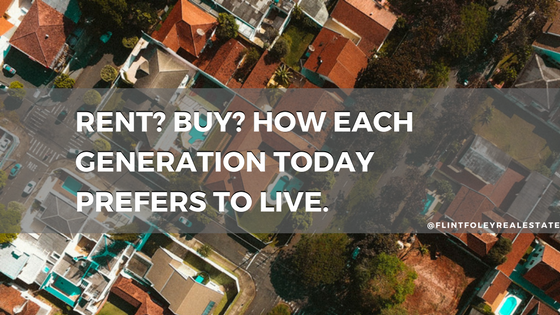Millennial home ownership rates have fallen faster than any other generation.
Women ages 65 and older are more likely to rent than to buy.
It seems as though these two groups are agreeing on something big thanks to the changing real estate climate. But what are the other trends in buying and renting? Check out this article for more.
The housing landscape has dramatically shifted in the last few generations, from the modest, affordable houses of the 1950s to the towering McMansions of the 1990s. Easy access to mortgages made buying a home in the '90s not just popular, but practically a social mandate.
Women ages 65 and older are more likely to rent than to buy.
It seems as though these two groups are agreeing on something big thanks to the changing real estate climate. But what are the other trends in buying and renting? Check out this article for more.
The housing landscape has dramatically shifted in the last few generations, from the modest, affordable houses of the 1950s to the towering McMansions of the 1990s. Easy access to mortgages made buying a home in the '90s not just popular, but practically a social mandate.
At that point, it usually made more sense for people to enter the real estate market and snatch up properties rather than rent. Yet, today, while McMansions may actually be seeing a resurgence in some areas, the right-sizing of homes is also trending. The baby boomers who bought those towering 7,000-square-foot McMansions in the '90s are downsizing and looking for those "just-the-right-size" houses.
Today, too, it's not just the preferences within the housing market that have changed; it's also the mentality surrounding owning a home. Renting, increasingly, is a more desirable option, whether as a deliberate choice or one driven by financial woes and housing shortages. According to research from Harvard University's Joint Center for Housing Studies, the nation's homeownership rate has been falling for more than eight years -- from its peak of 69 percent in 2004, to roughly 63.7 percent in 2015.
Many would assume millennials are driving this rental trend, but while there are generational differences as to who is buying versus renting, every generation is now looking at renting as a lifestyle choice, because of its flexibility. According to a recent Harris Poll commissioned by Realty Mogul, home ownership is not the top priority for many Americans, regardless of their age.
Here are the lifestyles reflected by each generation and how buying or renting a home impacts each one.
Baby Boomers
Baby boomers grew up during a time when housing was affordable and plentiful, and the American Dream took hold of mainstream culture. Yet, while members of this group are more likely to own a home than the younger generations behind them, that doesn't mean they're categorically against renting.
According to reporting by the Chicago Tribune, baby boomers are opting to sell their sprawling suburban homes when they become empty nesters and choosing to live in rental buildings with full amenities, avoiding tasks like mowing, snow-shoveling and keeping up with a mortgage. The choice to live more freely and in proximity to restaurants, shopping and recreation gives baby boomers more flexibility and lifestyle choices.
There is also a difference between what male boomers and female boomers want. According to the Realty Mogul/Harris Poll research, women ages 65 and older are more likely to prefer renting than do their male counterparts. Thirty-one percent of women ages 65 and older prefer renting if it means living a flexible lifestyle, compared to only 17 percent of men of this age.
Generation X
Generation X members aren't quite as flexible in their lifestyle and housing preferences as their younger generational counterparts, but they aren't too far behind millennials. According to reporting by CNN Money, Gen Xers are firmly staying in the rental market longer than expected. The reason, in part, is that higher rents and stagnant wages are making it harder to save up for a down payment.
But there's another reason apart from finances driving Gen Xers to forgo homeownership: The Realty Mogul/Harris Poll research showed that this age group may well be eager to return to a fast and fancy free lifestyle. For example, over a third of Gen Xers surveyed would prefer renting over owning a home if that carried with it the flexibility to move and explore job opportunities and avoid home maintenance responsibilities.
Millennials
Millennials have a reputation for forgoing traditional norms and are entering the housing market as home buyers much later than previous generations. Business Insider reported that millennial home ownership rates have fallen at a faster rate than that of any other age group. While some feel squeezed out of the housing market due to astronomical student-loan debt, others simply don't see the value in owning over renting.
Instead, they want to save and use their money for lifestyle enhancements, like travel. In fact, nearly half of millennials (18 to 34) polled would rather save their money to spend on traveling than put it toward buying a home.
And it's not just about travel, but lifestyle pleasures overall. Forty-seven percent of millennials surveyed said they would prefer renting if that meant they could still afford small luxuries like eating out and indulging in fancy coffees in their day-to-day lives, compared to 36 percent of those ages 35 to 44. Among those 65 years and older, only 25 of those surveyed felt the same way.
Rising Trends in Housing Investment
Home ownership is still the norm for some generations like the boomers, and remains a cultural norm, yet it can no longer be assumed that each generation will step into home ownership. The rising trend in renting creates another benefit in the investment marketplace: Homeowners and real estate investors alike can benefit from the demand for quality rentals, as more people look to renting to help fuel their dreams of travel and flexibility.
Renting out a room or basement is relatively simple, with resources like Trulia for long-term options or Airbnb for short-term solutions. This turns your home into a passive income stream. If you're looking to invest in real estate, saving up for a down payment or possibly leveraging the equity in your personal home are relatively straightforward options for those with good credit.
But the sheer volume of capital required to get in on a multi-family property is still an obstacle for many would-be investors. The current trend of crowdfunding properties has made it much easier to invest in commercial multi-family rental properties, even with as little as $1,000.
The new trend toward commercial crowdfunding is also a fascinating look at how investing in multi-family rental properties like apartment complexes no longer requires individual ownership. Instead, like-minded investors can crowdfund and collectively own these properties while creating passive income streams and collecting on those returns.
Source

